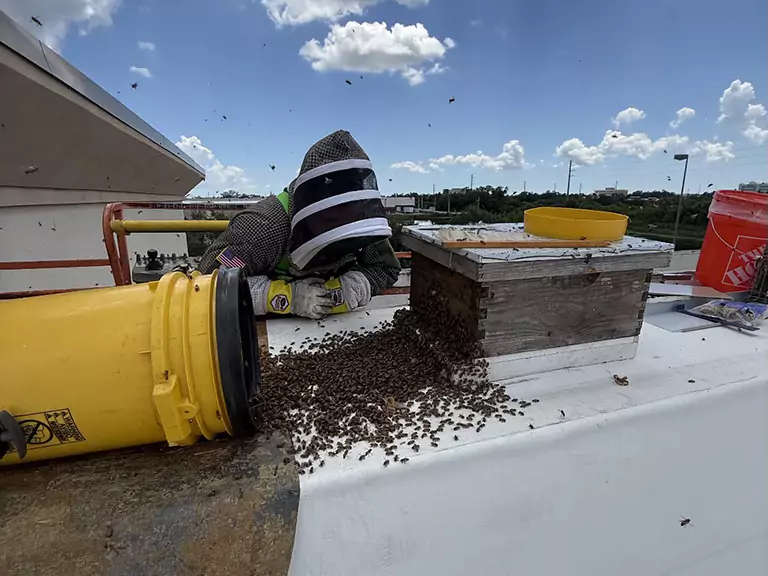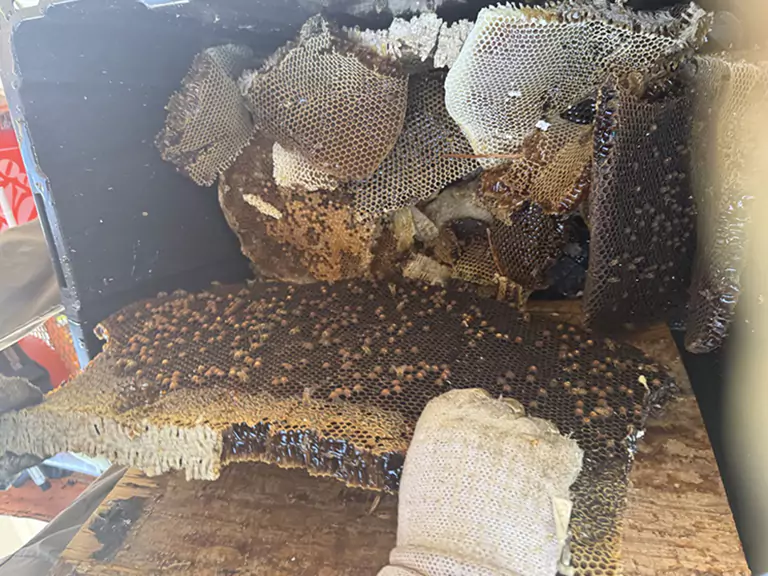If you’ve seen a swarm or hive forming near your home, business, or outdoor space, it’s natural to assume it’s just honey bees — but that assumption could be dangerous. In Florida, both European honey bees (commonly just called “honey bees”) and Africanized bees can take up residence on your property, and telling the difference isn’t as easy as it sounds.
Our team at Wildlife Works has extensive experience removing both bee types throughout Central Florida. This article breaks down the key differences and what you should know to stay safe and legal.
A Quick History of Africanized Honey Bees in the U.S.
In the 1950s, African honey bees were introduced to South America to improve honey production. These bees were a subspecies of Apis mellifera, brought from sub-Saharan Africa due to their strong survival traits and work ethic in hot climates.
But nature had its own plans — some of these African bees escaped and began breeding with local European bee populations. The result was the Africanized honey bee — a hybrid known for its aggressive behavior and rapid spread.
Over the decades, Africanized honey bees migrated north through Central America and Mexico, eventually establishing in Florida. Today, they’re found across parts of the state — including urban, suburban, and even coastal areas.
Africanized Bee Behavior vs Honey Bee Behavior
At first glance, Africanized bees and regular honey bees look nearly identical. Even trained professionals rely on lab testing to confirm the difference, using techniques like wing vein measurement or genetic sampling.
But their behavior is what truly sets them apart:
Aggressiveness: Africanized honey bees respond much faster to threats, sending out more guard bees and chasing intruders over longer distances.
Swarming: They swarm and relocate more frequently, making infestations harder to predict.
Defensiveness: Even small disturbances — like lawn equipment, children, or pets — can trigger a mass sting response.
Colony behavior: Entire colonies can become defensive if the nest is disturbed, unlike typical honey bees, which are more tolerant of activity nearby.
Understanding these bee behavior traits can help property owners spot potential threats and avoid costly or dangerous encounters.

Where Bees Nest: Common Nesting Sites in Florida
Both honey bees and Africanized bees seek out similar nesting sites, but their behavior in those spaces differs:
Inside wall voids or roof eaves
In attics, sheds, or outbuildings
Inside irrigation boxes, utility enclosures, or ground cavities
Around trees, under decks, or abandoned equipment
While a typical honey bee colony will quietly work in its chosen hive, Africanized bee colonies are more likely to relocate quickly, multiply rapidly, and respond aggressively to nearby activity.
Think Twice Before Killing a Hive: Safety Concerns
With Africanized bees, there are safety and liability risks:
You could misidentify the species.
You could trigger an aggressive swarm near others.
DIY sprays or sealing off the nest can trap bees and make things worse.
The safest path is always to contact professionals trained in bee species identification and legal removal.
What to Do if You Spot a Swarm or Hive
If you suspect Africanized honey bees or notice a growing bee colony:
Don’t get close. Keep children and pets away.
Don’t disturb the hive. Spraying or sealing it off could escalate the threat.
Watch behavior. Are bees aggressively flying at you? Are they relocating frequently?
Call experts. A licensed team can evaluate the hive, determine if it’s a risk, and remove it efficiently and legally.
How We Remove Bee Colonies in Central Florida
At Wildlife Works, we’ve helped hundreds of Florida homeowners and businesses safely manage bee colonies, including confirmed Africanized bee infestations. Here’s how we do it:
On-site evaluation to assess bee behavior and location.
Safe, efficient removal methods based on colony type and location.
Exclusion work to prevent future nesting at the same nesting site.
Local expertise ensures full compliance with Florida regulations.
See a Hive? Don’t Take the Risk.
If you’ve noticed unusual bee activity, especially near buildings or high-traffic areas, don’t wait to find out if they’re Africanized. Visit our Bee Removal Services page or contact us today for fast, knowledgeable help across Central Florida.
Need Help?
Call Now: 352-717-8727
Don’t wait for wildlife problems to escalate. Get expert help today.

